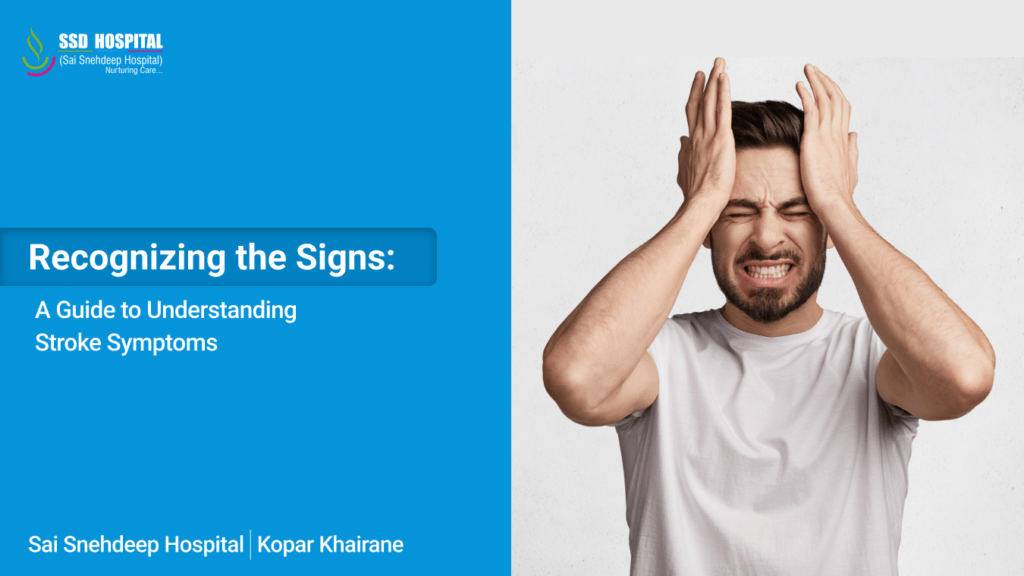Wintertime brings the joy of holiday festivities, warm blankets, and...
Read More- hello@ssdhospital.in
- +91 8989 58 5050

A stroke is a sudden interruption of blood flow to the brain, leading to the rapid loss of brain function. It’s a medical emergency that requires immediate attention. In this comprehensive guide, we’ll explore the types of strokes, their causes, risk factors, prevention strategies, and when to seek medical attention.
Cardiovascular disease encompasses a range of conditions affecting the heart and blood vessels. These include coronary artery disease (CAD), hypertension, heart failure, and stroke. These conditions often arise from a combination of risk factors such as high blood pressure, high cholesterol, smoking, diabetes, obesity, a sedentary lifestyle, and a family history of heart disease. Understanding these risk factors is crucial for early detection and prevention of cardiovascular issues.
Strokes can be classified into three main types:
1. Ischemic Stroke: Caused by a blockage or clot in a blood vessel supplying the brain.
2. Hemorrhagic Stroke: Caused by a ruptured blood vessel in the brain, leading to bleeding.
3. Transient Ischemic Attack (TIA): Often referred to as a "mini-stroke," TIAs are temporary episodes of stroke-like symptoms caused by a temporary decrease in blood supply to the brain.
Understanding the root causes of strokes is crucial for effective prevention and management. Some common causes include:
Several factors increase the risk of stroke. These include:
Preventing strokes involves adopting a healthy lifestyle and managing underlying health conditions. Consider the following preventive measures:
Early detection and intervention are crucial in managing strokes. Seek immediate medical attention if you experience any of the following symptoms:
Concerned about your risk of stroke or experiencing concerning symptoms? Take proactive steps towards well-being by booking an appointment with the esteemed neurology team at SSD Hospital in Mumbai.
Under the guidance of renowned professionals, you’ll receive personalized care and comprehensive guidance. Their expertise and dedication to patient well-being ensure you’re in the best hands.
Whether you’re facing specific difficulties like stroke recovery or simply seeking preventive checkups, SSD Hospital offers a range of services to cater to your needs.
At SSD Hospital, we understand the profound impact stroke can have on your life. That’s why we prioritize a compassionate and patient-centric approach, ensuring you feel heard, informed, and confident throughout your journey.
Remember, stroke is a medical emergency. If you or someone you know experiences symptoms of a stroke, don’t hesitate to seek immediate medical attention. Your health and well-being are our top priorities.
Strokes are a serious medical condition, but with knowledge and action, you can take steps to prevent them and improve your chances of a full recovery. By following a healthy lifestyle, managing underlying health conditions, and recognizing the warning signs, you can empower yourself to protect your brain health. Remember, early detection is critical. If you experience any stroke symptoms, call emergency services immediately. Don’t let stroke fear control your life – take charge of your health and prioritize your well-being.
If you’re in Mumbai and looking for expert stroke care, consider scheduling an appointment with the esteemed neurology team at SSD Hospital. Their team of renowned professionals offers personalized care and comprehensive guidance throughout your stroke journey, from preventive checkups to stroke recovery. SSD Hospital prioritizes a compassionate and patient-centric approach, ensuring you feel informed and confident throughout your experience.
For more information on stroke prevention, diagnosis, and treatment options, visit SSD Hospital’s website or contact them directly.
Wintertime brings the joy of holiday festivities, warm blankets, and...
Read MoreOsteoporosis, often referred to as the “silent disease,” is a...
Read MoreRisk Factors for Breast Cancer: What Every Woman Should Know...
Read MoreUnlocking Optimal Health: How a Balanced Diet Can Empower You...
Read MoreBook your Appointment